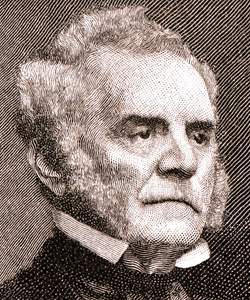Thomas Holliday Hicks (Congressional Biographical Directory)
Reference
HICKS, Thomas Holliday, a Senator from Maryland; born near East New Market, Dorchester County, Md., September 2, 1798; attended the local subscription schools; sheriff of Dorchester County in 1824; member, State legislature 1830; member of the State electoral college in 1836 and while a member of the college was elected to the State house of delegates in 1836; member of the Governor’s council in 1837; register of wills of Dorchester County 1838-1851, 1855-1861; member of the Maryland constitutional convention in 1851; Governor of Maryland 1857-1862; appointed and subsequently elected as a Unionist to the United States Senate to fill the vacancy caused by the death of James A. Pearce and served from December 29, 1862, until his death in Washington, D.C., February 14, 1865; interment in the Cambridge Cemetery, Cambridge, Md.
"Hicks, Thomas Holliday," Biographical Directory of the United States Congress, 1774 to Present, http://bioguide.congress.gov/scripts/biodisplay.pl?index=H000567.
Thomas Holliday Hicks (American National Biography)
Scholarship
During the secession crisis of 1860-1861, Governor Hicks took several crucial steps to keep the border slave state of Maryland in the Union. First he refused to meet officially with the agents of seceded southern states intent on persuading Maryland to join the Confederacy. Then, following the sentiments of the Unionist majority of Maryland, he refused to call a special session of the legislature, which met biennially and was not scheduled to meet until 1862. Staunchly he resisted a move to organize a state convention to consider the issue of secession. Throughout the winter Hicks remained convinced that the critical issue for Marylanders was that they choose for themselves their future, and he reminded the governor of South Carolina "that Maryland should not convene her legislature at the bidding of South Carolina."
While Hicks sympathized with southern opposition to the North's personal liberty laws that freed fugitive slaves, he continued to resist a Confederate conspiracy to force Maryland out of the Union. Appealing before the start of the war for peace and reason, he represented a moderate body of thought in Maryland, which believed that the border states of Kentucky, Delaware, Missouri, and Maryland could serve as territorial buffers between the North and South. Such a confederation might prevent war and serve as a force to adjudicate sectional differences peacefully.
While Hicks sympathized with southern opposition to the North's personal liberty laws that freed fugitive slaves, he continued to resist a Confederate conspiracy to force Maryland out of the Union. Appealing before the start of the war for peace and reason, he represented a moderate body of thought in Maryland, which believed that the border states of Kentucky, Delaware, Missouri, and Maryland could serve as territorial buffers between the North and South. Such a confederation might prevent war and serve as a force to adjudicate sectional differences peacefully.
Jean H. Baker, "Hicks, Thomas Holliday," American National Biography Online, February 2000, http://www.anb.org/articles/04/04-00496.html.





